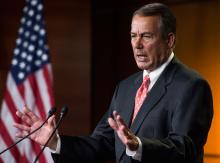Faith and Politics

There is some good stuff on the God’s Politics blog this week encouraging Christians to drop their concern about the “war on Christmas.” It’s a good idea. However, as we’re getting over our huff about “Happy Holidays,” we’d like to shift your attention to the real war on Christmas: the priorities of Washington politicians that are fundamentally at odds with the hope, love, joy, and peace celebrated by Christians during the Advent season.
As political leaders engage in negotiations to avoid the so-called “fiscal cliff,” we need them to preserve programs that reduce poverty and keep our families healthy. Unfortunately, House Speaker John Boehner and others in Congress are pushing to cut programs for the poor and vulnerable, while protecting tax breaks for the wealthiest Americans.

Editor's Note: The following is a statement by Jim Wallis given at the kickoff of the National Strategy Session — a gathering faith, law enforcement, and business leaders who are reaching consensus on common-sense immigration reform. Throughout the week, the group is calling on Congress to create a road to citizenship for immigrants contributing to our society. You can follow a live stream of the press conference and strategy sessions HERE.
It’s quite an accomplishment to get Bibles, Badges and Business together all in one room and agreeing on something this big. This reminds us all that Christmas and the holiday season really is a time for miracles. It’s enough to make you believe there is a God! The country is hungry to see our political leaders work together and find a bipartisan solution to an issue of this magnitude. I have faith that comprehensive immigration reform is that common ground. And if we do this, who knows what else it might lead to.

Most Americans say that employers — even religious ones — should provide birth control coverage to their employees, according to a survey released on Monday.
The poll by LifeWay Research also showed that almost two-thirds of Americans (63 percent) believe businesses should be required to provide the coverage for free, even if contraception conflicts with the owner’s religious ethics.
As part of the Affordable Care Act, the 2010 health care reform law, President Barack Obama issued regulations that require most employers, including some religious ones like Catholic colleges and hospitals, to provide birth control coverage. The administration has said it may expand the policy to accommodate additional religious organizations.

On my desk, next to my laptop, is a can of seltzer water. My grapefruit-flavored, bubbly water sits about four inches away from my left hand as I write. When the can is empty, I might take another from the fridge or fill up a water bottle at the kitchen sink.
Water drives my day, but I rarely think about it. I cook pasta in it. I heat water to make tea. I fill a bucket to mop the floor and a draw a bath with hot water and soak in it. At the moment, my dishwasher is growling away, and I’m waiting to hear the pleasant beep that alerts me that the clothes in the washer downstairs are clean.
I’ve never considered water a women’s issue. Not until this past week, that is. On Friday, the day before World AIDS Day 2012, I had the privilege of attending World Vision’s Strong Women, Strong World luncheon in New York City. Strong Women, Strong World is a new initiative “supporting sustainable change in some of the difficult places in the world to be a girl or a woman.” The focus of the day was water.
The Honorable Melanne Verveer, U.S. Ambassador at-large for Global Women’s Issues, spoke at the event. She celebrated the progress humanitarian organizations such as World Vision have made in the effort to eradicate HIV/AIDS, but reminded us that the number of people living with HIV is at an all-time high. In 2010, HIV/AIDS killed 1.8 million people. Sixty percent of those living with HIV are girls and women, and AIDS is the leading cause of death of women of reproductive age (15-44 years old) globally.
“HIV,” Ambassador Verveer said, “has the face of a woman.”

As President Barack Obama comes off of a substantial second victory, many pundits have pointed to the youth vote and a significant factor in his most recent success. Reports show that 60 percent of young voters cast ballots for Obama, while only 36 percent voted for Gov. Mitt Romney's more conservative policies. While many older voters believe this suggests young voters are unaware or uninterested in the nation's economic concerns, a major platform in the 2012 election, a number of polls suggest the economy is actually a top priority for most young voters. As it happens, though, young people seem to have very different ideas on how best to handle economic instability than their older counterparts.

ST. LOUIS — A federal appeals court on Wednesday temporarily blocked the enforcement of the Obama administration's contraception mandate while a Catholic business owner appeals a lower court's ruling that tossed out his suit.
Opponents of the law said that it was the first time that an appeals court had weighed in on the issue, which has spawned multiple suits across the country, and called it a “significant victory.”
“The order sends a message that the religious beliefs of employers must be respected by the government,” said Francis Manion, senior counsel of the American Center for Law and Justice, one of the lawyers representing Frank O'Brien.
In a two-sentence order issued Wednesday, a three-judge panel of the St. Louis-based 8th U.S. Circuit Court of Appeals voted 2-1 to grant O'Brien's company a delay while the appeal is heard.

Soon after George W. Bush won his first presidential election, Washington lobbyist, Grover Norquist, helped craft the tax cut legislation that would go down in history as “the Bush-era tax cuts.” Among other things, the legislation dropped top marginal tax rates from 39.6 percent to 35 percent and was written to expire on Dec. 31, 2010.
In 2010, Democrats tried to put forward two separate packages of legislation that would extend the cuts, first for earnings up to $250,000, then for earnings up to $1 million. The Democratic-led House passed both bills, but Republican filibuster blocked both in the Senate. President Barack Obama resolved the stalemate by extending all the Bush tax cuts for two more years.
Here’s the irony: Republicans claim to hate deficits, but the facts are clear. If extended indefinitely, the Bush-era tax cuts will account for nearly half of America’s budget deficit by the year 2019.
WASHINGTON — As a coalition of mostly Christian groups gathered here Thursday to support church leaders who have publicly questioned U.S. aid to Israel, those same church leaders signaled that they want to reconcile with the Jewish groups who were upset by their action.
An Oct. 5 letter asking Congress to investigate U.S. aid to Israel led Jewish groups to cancel a long-planned meeting later that month of the Christian-Jewish Roundtable, a eight-year-old group dedicated to improving relations between the two faiths.
The Rev. Gradye Parsons, the top official of the Presbyterian Church (USA) and the first signatory on the letter, did not attend Thursday's Washington press conference that was convened to support its message. But Parsons said he stands by the letter, and acknowledged that it heightened tensions between Jews and Christians on the roundtable.
“We regret any distancing it put between us and our Jewish partners," he said, "and we hope we can close that gap."

After November’s presidential vote, Catholics could cite ample evidence for their renewed political relevance while dispirited evangelicals were left wondering if they are destined to be yesterday’s election news. Yet their roles in American spiritual life may be reversed.
New research shows that Catholics now report the lowest proportion of "strongly affiliated" followers among major American religious traditions, while the data indicates that evangelicals are increasingly devout and committed to their faith.
According to Philip Schwadel, a sociologist at the University of Nebraska-Lincoln, in the 1970s there was only a five-point difference between how strongly Catholics and evangelicals felt about their religion.
By 2010, he said, that “intensity gap” had grown to around 20 points, with some 56 percent of evangelicals describing themselves as “strongly affiliated” with their religion compared with 35 percent of Catholics. Even mainline Protestants reported a higher level of religious intensity than Catholics, at 39 percent.

Corruption has gone too far. The righteous must break away. Hope now rests with a holy remnant that will honor foundational texts.
The message sounds familiar. A church schism? No, mounting calls for secession from the United States.
Since President Barack Obama won re-election, more than 750,000 Americans have petitioned the White House website to let their respective states secede, from Alaska to Iowa to Maryland and Vermont. Those leading the charge are framing it, observers say, in terms that suggest a deep-seated religious impulse for purity-through-separation is flaring up once again.
But this time, it’s playing out on a political stage.
“Today's secessionist movements are just the latest example of a long parade of breakaway groups [in American history] seeking to restore some lost ideal,” said Peter J. Thuesen, professor of religious studies at Indiana University-Purdue University Indianapolis. “The problem is that the ideal is invariably a mirage.”

Now that the election is over, policymakers and the media have refocused their attention on the looming budget battles in Washington. In January, a variety of tax increases and spending cuts will go into effect unless Congress and President Barack Obama agree on a plan to avoid what has been deemed “the fiscal cliff.”
As the country braces for another fiscal showdown in the nation’s capitol, here are five things you need to know on the issue likely to dominate the news over the next several months.

Religion is far too judgmental. Surveys show that many people think that, especially a new generation of young people who — more than ever before — are checking the “none of the above” religious affiliation box.
I get it. But religious leaders tend to be judgmental about many of the wrong things; they are not making moral judgments on the important questions. So I am going to be judgmental, as a religious leader, about something I just read.
A recent Harris International and World Vision poll showed that Americans plan to spend more this Christmas season on consumer gifts than they did last year, but give less to charities and ministries that help the poor. Many say they are less likely to give a charitable gift as a holiday present — a drop from 51 percent to 45 percent.
So we will have more Christmas presents this year, but less help for the poor. While retailers, economists, and politicians may rejoice at the news about higher consumer spending this year, the lower levels of support for the ones Jesus called “the least of these” should legitimately bring some moral judgments from the faith community.
Indeed, the Matthew 25 scripture that this text is taken from is one of the few and most judgmental passages in all the New Testament. About some things, Jesus was judgmental. The Gospel clearly says that how we treat the hungry, the thirsty, the stranger, the naked, the sick, and the prisoner, is how we treat Jesus. That’s is pretty judgmental, especially when you go on to read what will happen to those who ignore Jesus in this way.
But rather than just being judgmental, let’s do something about it. Let’s start “A Christmas Tithe.”

The book of Jeremiah straddles the most momentous event of Israel’s history: the destruction of Jerusalem and its temple and the exile of its leaders to Babylon (586 B.C.E.). In the first half of the book of Jeremiah, the prophet announces that God is furious with the people of Judah, in particular its leaders, because they have reneged on the covenant they made with God through Moses. They have not taken care of the poor, and they have not lived according to the stringent demands to worship God alone.
Not surprisingly, the leaders do not want to hear Jeremiah’s critiques of their ways of doing business. No politician wants to look weak – even before a god. According to Jeremiah, the leaders of Judah have prioritized – not the building of an ethical community – but their own comfort and position. Their desire to maintain their own power and influence has trumped everything. And these politicians have justified their behavior so many times and in so many ways, they don’t even recognize how far they have fallen from the ideal that guided the building of the nation.

CANTERBURY, England — When the Church of England scuttled plans to allow women bishops on Nov. 20, incoming Archbishop of Canterbury Justin Welby called it “a very grim day for women and their supporters.”
Now, that grim day is turning into a church-state nightmare for Britain's established church.
On Monday, The Times of London quoted from a leaked memo to church leaders from William Fittall, secretary general of the General Synod, who called the public and political fallout "severe."
In any genuine community ... self-interest and public interest are not at odds, but are two names for the same thing. —Andrew Delbanco
COMMUNITY ORGANIZING has been around for a long time—certainly long before 2008, when it became a household word during Barack Obama's rise to the presidency. Not that it is understood nowadays any more than before.
I thought I knew what community organizing was when I served as the pastor of First Congregational United Church of Christ and was introduced to a newly formed faith-based organizing project called Inland Congregations United for Change (ICUC) in San Bernardino, California. But I soon learned that community organizing had a different starting point, as well as a different methodology, than I thought.
As a pastor, I had always been concerned about challenging injustice. However, I came to understand that community organizing is less about taking on yet another good cause and more about the important work of building human community.
As such, community organizing is a perfect fit for religious congregations and clergy. It addresses social justice concerns in the larger community, putting democracy to work by giving voice to ordinary families. But more important, community organizing can strengthen the life of the congregation. And it can bring power to the vocation of the religious leader.

FATHER JACK MORRIS was one of those Catholic priests who ruined a lot of people for life. I'm one of them.
Father Morris passed away Sept. 30 in Spokane, Wash. He was working with the Catholic sisters and others who ran the highly regarded Copper Valley School in Alaska in the late 1950s when he took the idea of young people volunteering their time with and for Native Alaskans and helped turn it into the Jesuit Volunteer Corps. Since then, more than 12,000 people have served in the JVC, whose motto "ruined for life" reflects the fact that voluntary service often makes enduring changes in the way participants view the world. (A few years ago, Father Morris told Sojourners that the motto is "a resurrection statement"—through volunteering, he said, "you're transformed.")
I spent my first two years after college as a Jesuit Volunteer, first at the Oregon Center for Peace and Justice in Portland and then at Georgetown University's Center for Peace Studies. My mentor and boss in Portland was the center's director, Sister Michele Phiffer. She worked for years helping Catholics in Oregon understand the church's social teaching on the common good and the preferential option for people who are poor.
Perhaps needless to say, the local bishops weren't always on her side. In fact, it often appeared—even to my young eyes—that the bishops were more interested in protecting their own privilege and power than in genuinely working for the marginalized. And Sister Michele's gender seemed to be a factor in the lack of support she received from the episcopal powers that were.

In the dark days of Advent, we wonder when the birth pangs will end: Will light break into the darkest corners of our hearts, our families, our lives? Will God—can God—take the twisted sinew of our warped world and redeem it? Will we—can we—hold on through the night? Can we trust that light to come? These are the questions of Advent.
As we enter the season of Epiphany, new questions arise: Will we allow the light that has broken forth to illuminate the darkest corners of hearts, our families, and our lives? Can we—will we—follow Jesus as he untwists the mangled metal of our shattered souls ... and redeems it? Can we—will we—trust the light or will we hide from it? These are the questions of Epiphany.
The light of Epiphany illuminates in two directions: It flashes inward, revealing our twisted and fragmented souls, and it flashes outward, revealing the carnage and consequences of the lies our world has embraced and used to craft public policy, the lies we have believed and reinforced through our complicit acceptance, and the truth we must speak.
As we enter 2013, we look back and see that over the past four years much public good was done. Remember: The Lilly Ledbetter Fair Pay Act made it easier for women to fight pay discrimination. Remember the drama when Congress passed the Affordable Care Act and the Supreme Court upheld it, creating a path for tens of millions of Americans to finally receive health care. Remember the image of the last troops leaving Iraq.

JUST AFTER THE election, a New York Times editorial implored the president and Congress to "get to work fixing the current badly flawed, out-of-date campaign finance system." The Kansas City Star called it "painfully obvious" that the system needed change.
Those were after the 2008 and 2004 elections.
We all know how the cycle works: Every four years, politicians mount ever-more-expensive campaigns. After each election, the nation's papers call for reform. Meanwhile, business as usual—the business of the lobbyists, that is—continues in Washington.
So here's a proposal: Let's put an end to this cycle. Call it the "Reform in Four" campaign.
Step 1: Build a bigger army. We need to immediately broaden the coalition for reform—from environmentalists to the faith community to pro-reform Republicans, corporate leaders, and Tea Party members who are concerned about cronyism. The good news is that, in a July 2012 Gallup poll, 87 percent of Americans said that "reducing corruption in the federal government" should be a "very important" or "extremely important" priority for the next president. It ranked second, just below job creation (at 92 percent).

A lot of ink, pixels, and air have been used on the potential effects of the so-called “fiscal cliff.” While many experts say that “cliff” is a misnomer (it’s more of long slope in the wrong direction), there is at least broad agreement that it’s not the right direction for the country’s long-term health.
We’ve heard a lot about the potential effects on Wall Street, our nation’s credit rating, and even the military. But little has been said about the devastating consequences for our nation and the world’s poorest and most vulnerable people — or for the charities and non-profits that serve them.
This week, the Circle of Protection, released an open letter to the president and Congress with a simple message: during the holidays, please “advance policies that protect the poor — not ones that make them poorer.”

NEW YORK — It's a short walk from Ground Zero to the Staten Island Ferry terminal.
If you're a dedicated tourist, you can see where a terrorist attack occurred on 9/11 and then hop a ferry to see where Hurricane Sandy devastated Staten Island's oceanfront last month.
Sad to say, but that's exactly what many tourists are doing. Instead of going to Staten Island to help traumatized residents, they go to gawk. Then they go back to Manhattan for lunch and holiday shopping.
This is what happens when people lose a basic sense of obligation to one another. It no longer seems sane or necessary to be charitable. Instead, people feel justified in looking away from need. They feel disconnected from neighbors who are suffering. When the storms of life hit, they call themselves “makers” and dismiss the “takers” as lazy.